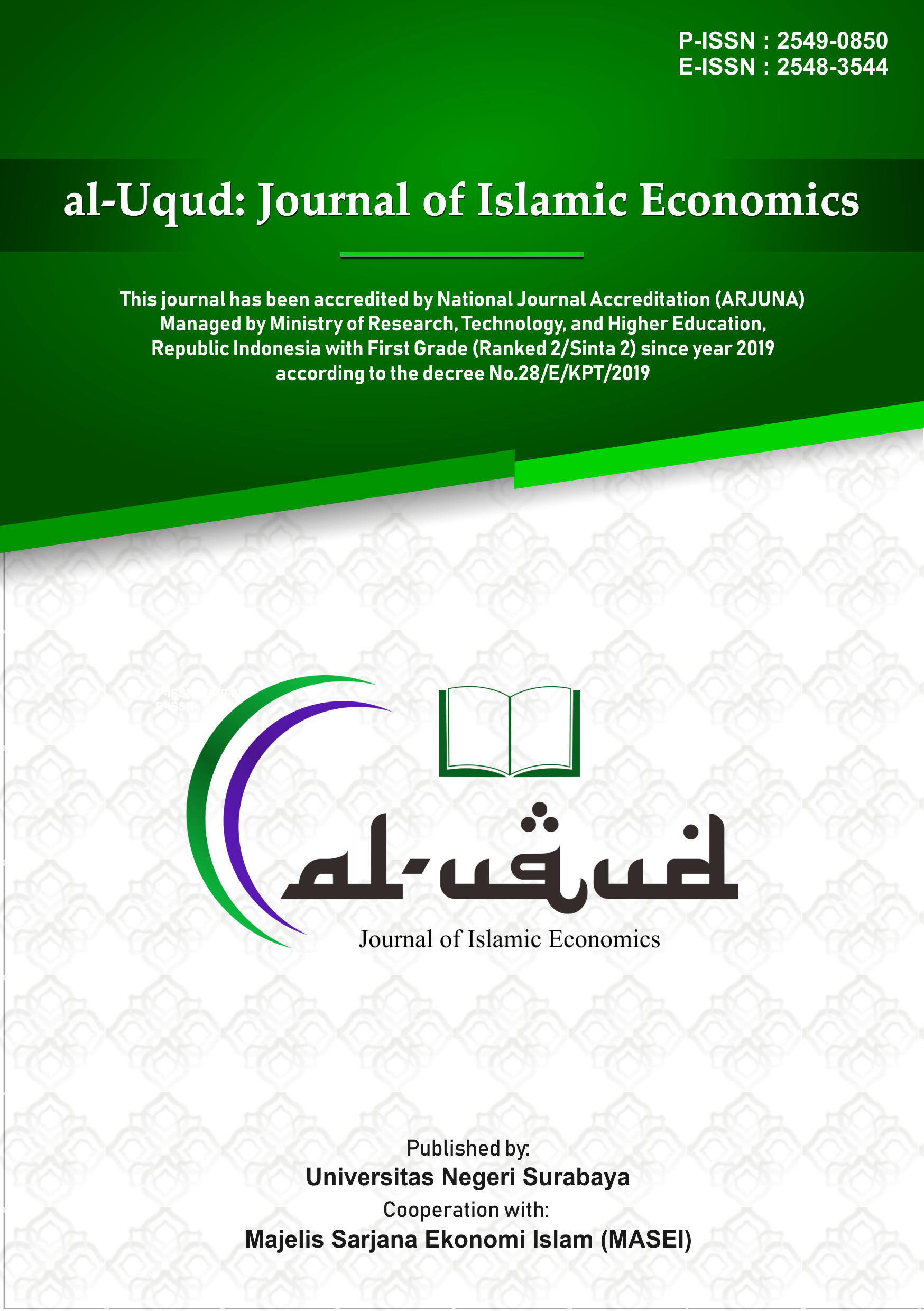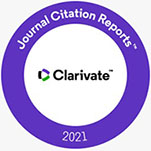Halal Tourism Based on Value Creation
DOI:
https://doi.org/10.26740/al-uqud.v4n2.p268-284Keywords:
Halal, Tourism, Value CreationAbstract
Nowadays, halal tourism product is not only focused on Muslim tourists, but also non-Muslim one. The halal tourism industry needs to develop the people understanding of halal values in order to bring benefits to consumers through recognition of the tourism management potency as well as the need of value identification. This research aimed to develop value-based tourism, identify the value types, as well as create value as the basis for managing lawful tourism, which needs a model to facilitate recognizion of the tourism product excellence. This research used qualitative case study approach, with the head of tourism in the region where has potency to implement Islamic Marketing Concept as the key informants. The result showed that halal marketing included not only about product but also about pricing, promotion, and place. Muslim consumers were keen on tourism services that implement lawful approach. Furthermore, there were ten values of tourism in Indonesia e.g. Religious Tourism, Geo Tourism, Natural Tourism, Fashion Tourism, Culinary Tourism, Medical Tourism, Historical Tourism, Sport Tourism, Culture Tourism, and Hospitality Tourism.
References
Abubakar, A. M., & Ilkan, M. (2016). Impact of online WOM on destination trust and intention to travel: A medical tourism perspective. Journal of Destination Marketing & Management, 5(3), 192-201. https://doi.org/10.1016/j.jdmm.2015.12.005
Adimaja, M. (2014, October 16). Indonesia to Soon Become Trendsetter in IslamicFashion , ( Online), retrieved from http://www.antaranews.com/en/news/96103/indonesia-to-soon-become-trendsetter-in-islamic-fashion , accessed 15 September 2016.
Altinay, L., Marianna S., & Victoria W. (2016). Social Value Creation through Tourism Enterprise. Tourism Management, 54, 404-417. https://doi.org/10.1016/j.annals.2009.01.002
Battour, M. & Mohd N. I. (2016) Halal Tourism: Concepts, Practices, Challenges and Future. Tourism Management Perspectives, 19, 150-154. https://doi.org/10.1016/j.tmp.2015.12.008
Battour, M., Hakimian, F., Ismail, M. and BoÄŸan, E. (2018).The perception of non-Muslim tourists towards halal tourism: Evidence from Turkey and Malaysia. Journal of Islamic Marketing, Vol. 9 No. 4, pp. 823-840. https://doi.org/10.1108/JIMA-07-2017-0072
Boğan, E. and Sarıışık, M. (2019). Halal tourism: conceptual and practical challenges. Journal of Islamic Marketing, Vol. 10 No. 1, pp. 87-96. https://doi.org/10.1108/JIMA-06-2017-0066
Briliana, V., & Mursito, N. (2017). Exploring antecedents and consequences of Indonesian Muslim youths' attitude towards halal cosmetic products: A case study in Jakarta. Asia Pacific Management Review, 22(4), 176-184. https://doi.org/10.1016/j.apmrv.2017.07.012
Chanin, O., Piangpis S., Hamzah A. R., & Mohd S. D. (2015). Guidelines on Halal Tourism Management in the Andaman Sea Coast of Thailand. Journal of Economics, Business and Management, 3(8). joebm.com/papers/287-T10009.pdf
Chookaew, S., Oraphan C., Jirapa C., Pingpis S., & Sudarat N. (2015). Increasing Tourism Potential at Andaman Halal Gulf in Thailand for Muslim Country. Journal of Economics, Business and Management, 3 (7). 10.7763/JOEBM.2015.V3.277
Committee for Economic and Commercial Cooperation of the Organization of Islamic Cooperation (COMCEC). (2016, February). Muslim Friendly Tourism: Understanding the Demand and Supply Sides in the OIC Member Countries (www.comcec.org). Turkey.http://www.sbb.gov.tr/wp-content/uploads/2018/11/Muslim_Friendly_Tourism_Understanding_the_Demand_and_Supply_Sides_in_the_OIC_Member_Countries%E2%80%8B.pdf
Dakhoir, Ahmad. (2018). œIndonesia Tuan Rumah Annual Meeting IMF 2018, œSelamat Datang di Pusat Halal Dunia. Tribun Kalteng.com. https://kalteng.tribunnews.com/2018/07/26/opini-indonesia-tuan-rumah-jelang-annaul-meeting-imf-2018-selamat-datang-di-pusat-halal-dunia.
Eid, R., & Hatem E. G. (2015). The Role of Islamic Religiosity on The Relationship Between Perceived Value and Tourist Satisfaction . Tourism Management , 46, 477-488. https://doi.org/10.1016/j.tourman.2014.08.003
El-Gohary, H. (2016). Halal tourism, is it really Halal?. Tourism Management Perspectives, 19, 124-130. https://doi.org/10.1016/j.tmp.2015.12.013
Harahsheh, S., Haddad, R. and Alshorman, M. (2019). Implications of marketing Jordan as a Halal tourism destination. Journal of Islamic Marketing, Vol. 11 No. 1, pp. 97-116. https://doi.org/10.1108/JIMA-02-2018-0036
H. El-Gohary, (2015). Is it really Halal ?. Journal of Halal Tourism. Faculty of Business, Law, and Social Science, Birmingham University, United Kingdom Cairo University Business School, Cairo University, Egypt. 10.1016/j.tmp.2015.12.013
Isa, S.M., Chin, P.N. and Mohammad, N.U. (2018). Muslim tourist perceived value: a study on Malaysia Halal tourism. Journal of Islamic Marketing, Vol. 9 No. 2, pp. 402-420. https://doi.org/10.1108/JIMA-11-2016-0083
Jafari, J., & Noel S. (2014). Muslim World and Its Tourisms. Annuals of Tourism Research, 44, 1-19. https://doi.org/10.1016/j.annals.2013.08.011
Jajeli, R. (2013, July 11). Cheng Hoo Mosque, Masjid Unique Shaped Temple in Surabaya, (Online), retrieved from http://travel.detik.com/read/2013/07/11/164040/2299799/1383/masjid-cheng-hoo- mosque-unique-shaped-temple-in-Surabaya , accessed 15 September 2016.
Jakarta.go.id (2017, January). Kota Tua Jakarta (Online), retrieved 19 September 2020 from https://jakarta.go.id/artikel/konten/2113/kota-tua-jakarta
Khan, F. and Callanan, M. (2017). The Halalification of tourism. Journal of Islamic Marketing, Vol. 8 No. 4, pp. 558-577. https://doi.org/10.1108/JIMA-01-2016-0001
Kovjanic, G. (2014). Islamic Tourism as a Factor of the Middle East Regional Development. TURIZAM, 18(1), 33-43. http://www.dgt.uns.ac.rs/turizam/arhiva/vol_1801_4.pdf
Liputan6 (2019, September). Trowulan, Educational and Entertaining Mojokerto Historical Site (Online), retrieved from https://surabaya.liputan6.com/read/4053045/trowulan-situs-sejarah-mojokerto-yang-edukatif-dan-menghibur, accessed 19 September 2020
Mahmud, H. (2014). Promoting Islamic Tourism in Brunei: Towards Understanding Customers through the Shariah Compliant Hotel Concepts (Masters thesis). University of Nottingham, Nottingham NG7 2R, Britain. http://eprints.nottingham.ac.uk/27242/1/HajiMohamedHajiMahmud.pdf
Mastercard and CrescentRating (2018), œGlobal Muslim travel index 2018, available at: www.crescentrating.com/halal-muslim-travel-market-reports.html
Mohsin, A., Noriah R., & Bader A. A. (2016). Halal Tourism: Emerging Opportunities. Tourism Management Perspectives, 19, 137-143. https://doi.org/10.1016/j.tmp.2015.12.010
Mohammed, A.r & Mustafa I. (2016). Impact of Online WOM on Destination Trust and Intention to Travel: A Medical Tourism Perspective. Journal of Destination Marketing & Management, 5, 192-201. https://doi.org/10.1016/j.jdmm.2015.12.005
Munirah, L., & Ismail, H. N. (2012). Muslim Tourists' Typologi in Malaysia: Perspectives and Challenges. Proceedings of the Tourism and Hospitality International Conference. Malaysia: Department of Urban and Regional Planning, Faculty of Built Environment. https://www.researchgate.net/publication/303805265_Muslim_Tourists%27_Typology_in_Malaysia_Perspective_and_Challenges
O'Cass, A., & Phyra S. (2015). An Exploratory Study into Managing Value Creation in Tourism Service Firms: Understanding Value Creation Phases at The Intersection of The Tourism Service Firm and Their Customers. Tourism Management, 51, 186-200. https://doi.org/10.1016/j.tourman.2015.05.024
Othman, N., Rozian M. T., & Shaya'a O. (2015). Maqasid Al Shariah in 2015. The Governance and Management Strategy of Islamic Tourism Businesses. Proceedings Paper of the International Conference on Maqasid Al Shariah in Public Policy and Governance , Malaysia: International Institute of Advanced Islamic Studies (IAIS). https://www.slideshare.net/OTTOMAN/maqasid-al-shariah-in-management-strategy-of-islamic-tourism-55409896
Pamukcu, H. and Sariisik, M. (2020). Suggestions for standardization of halal tourism in hospitality industry. Journal of Islamic Marketing, Vol. ahead-of-print No. ahead-of-print. https://doi.org/10.1108/JIMA-04-2019-0078
Rahman, M., Moghavvemi, S., Thirumoorthi, T. and Rahman, M.K. (2020), "The impact of tourists perceptions on halal tourism destination: a structural model analysis", Tourism Review, Vol. 75 No. 3, pp. 575-594. https://doi.org/10.1108/TR-05-2019-0182
Ratnasari, Ririn, Tri, Gunawan, Sri, Septiarini, Dina, Fitrisia, Rusmita, Sylva, Alif, Kirana, Kusuma, Chandra. 2020. Customer Satisfaction between Perceptions of Environment Destination Brand and Behavioural Intention. International Journal of Innovation, Creativity and Change, Volume 10, Issue 12. https://www.ijicc.net/images/vol10iss12/101236_Ratnasari_2020_E_R.pdf
Ratnasari, R.T., Gunawan, S., Mawardi, I., Kirana, K.C. 2020. Emotional experience on behavioral intention for halal tourism. Journal of Islamic Marketing. https://doi.org/10.1108/JIMA-12-2019-0256
Republika. (2009, 19 February). Bali World's Best Destination Spa , (Online), retrieved from http://www.republika.co.id/berita/shortlink/32334 , accessed 10 September 2019.
Ryan, C. (2016). Halal Tourism. Tourism Management Perspectives, 19 , 121- 123. 10.1016/j.tmp.2015.12.014
Samori, Z., Nor Z. Md S., & Mohammad K. M. (2016). Current Trends on Halal Tourism: Cases on Selected Asian Countries. Tourism Management Perspectives, 19, 131-
Shafaei, F., & Badaruddin M. (2015). Malaysia's branding as a n Islamic Tourism Hub: a n Assessment . Malaysian Journal of Society and Space, 11(1), 97-106. https://www.researchgate.net/publication/282854273_Malaysia%27s_branding_as_an_Islamic_tourism_hub_An_assessment
Singh, S., Tapas R. D., & Irina V. (2016). Tourism, Ecotourism and Sport Tourism: The Framework for Certification. Marketing Intelligence & Planning, 34 (2), 236- 255. https://doi.org/10.1108/MIP-09-2014-0180
Siahaan, S. (2008). An Overview of Tourism Destination Marketing Perspective. Scientific Magazine Panorama Archipelago, Edition IV.
Stephenson , M. L. (2014). Deciphering 'Islamic Hospitality': Developments, Challenges and Opportunities. Tourism Management, 40, 155-164. https://doi.org/10.1016/j.tourman.2013.05.002
Syazwan, Abu T. M. & and Mohd Johan M. R. (2012). Issues in Halal Packaging: A Conceptual Paper. International Business and Management, 5(2). http://dx.doi.org/10.3968/j.ibm.1923842820120502.1080
Timothy, J. D. (2007). Tourism and Islam: Consideration of culture and duty. London and New York: Routledge Taylor & Francis Group. https://doi.org/10.4324/9780203001073
UNWTO Tourism Highlights, (2010). https://www.e-unwto.org/doi/book/10.18111/9789284413720
Vargas-Sánchez, A. and Moral-Moral, M. (2019), "Halal tourism: literature review and experts view", Journal of Islamic Marketing, Vol. 11 No. 3, pp. 549-569. https://doi.org/10.1108/JIMA-04-2017-0039
Voskuil, R. P. (2007). Bandung, Citra sebuah kota. Departemen Planologi ITB bekerja sama dengan PT. Jagaddhita.
Ward, F. S. (2014). Performing Art as a Product of Cultural Tourism in Acehnese Cultural Context: Case Study of Saman Dance, Indonesia. Research Paper Department of Southeast Asian Studies Faculty of Arts and Social Sciences. University of Malaya for Partial F ulfillment of ATEA3321 (Cultural Tourism of South East Asian) .
Wijaya, S., Alison M., Thu-Huong N., & Brian K. (2016). Exploration of Culinary Tourism in Indonesia: What Do the International Visitors Expect?. Asia Tourism Forum 2016 - The 12th Biennial Conference of Hospitality and Tourism Industry in Asia (ATF-16) .
Wilson, J.A.J., Belk, R.W., Bamossy, G.J., Sandikci, O., Kartajaya, H., Sobh, R., Liu, J. and Scott, L. (2013). Crescent marketing, Muslim geographies and Brand Islam reflections from the JIMA senior advisory board. Journal of Islamic Marketing, Vol. 4 No. 1, pp. 22-50. https://doi.org/10.1108/17590831311306336
Yagmur, Y., Ehtiyar, R. and Aksu, A. (2019). Evaluation of halal tourism in terms of bibliometric characteristics. Journal of Islamic Marketing, Vol. ahead-of-print No. ahead-of-print. https://doi.org/
Yaman, R., Alias, Z., & Ishak, N. M. (2012). Beauty treatment and spa design from Islamic perspective. Procedia-Social and Behavioral Sciences, 50, 492-501. https://doi.org/10.1016/j.sbspro.2012.08.053
Downloads
Published
How to Cite
Issue
Section
License
CC BY 4.0 Abstract views: 3417
,
Abstract views: 3417
, PDF Downloads: 2202
PDF Downloads: 2202








